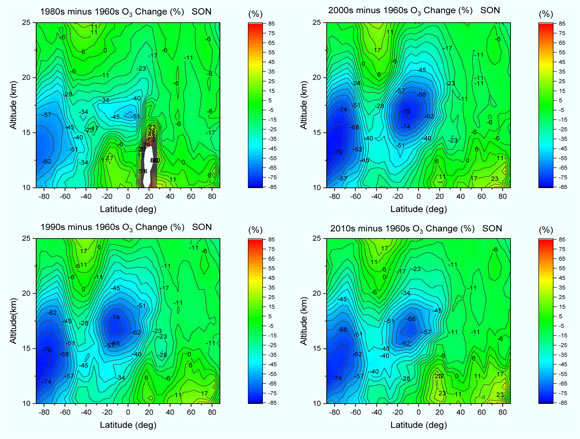The Earth’s ozone layer has developed a new, extremely large hole that operates year-round in the lower stratosphere of the tropics.
According to Sci-News, Professor Qing-Bin Lu from the University of Waterloo in Canada has discovered a significant ozone hole that functions year-round in the lower stratosphere of the tropical region (30 degrees North – 30 degrees South).
The depth of this tropical ozone hole is comparable to the well-known spring ozone hole in Antarctica, while its area is about 7 times larger than the Antarctic ozone hole!

Images and measurements showing a “year-round” ozone hole in the tropics – (Photo: AIP Advances).
Professor Qing-Bin Lu stated that the new hole may have existed in the lower stratosphere of the tropics since the 1980s, with ozone loss exceeding 25% compared to an intact atmosphere.
In the mid-1970s, atmospheric studies indicated that the ozone layer, which absorbs most of the Sun’s ultraviolet radiation, could be depleted due to industrial chemicals known as chlorofluorocarbons (CFCs). The discovery of the ozone hole in Antarctica in 1985 confirmed the ozone depletion caused by chlorofluorocarbons.
Although bans on such chemicals have helped slow the depletion of the ozone layer, evidence suggests that ozone depletion persists.
“The tropics cover half of the planet’s surface area and are home to about half of the world’s population; the existence of the tropical ozone hole could raise significant global concerns,” Professor Lu explained.
Tropical ozone depletion could pose major global concerns, leading to increased ground-level ultraviolet radiation, which may elevate the risk of skin cancer and cataracts in humans, weaken the human immune system, decrease agricultural productivity, and negatively impact sensitive organisms and aquatic systems.
The discovery of a year-round ozone hole in the tropics has surprised the scientific community, as it was not predicted by conventional photochemical models. The new hole could contribute to additional “temperature holes,” further exacerbating a planet that is already “heating up.”
“The current discovery calls for more careful studies on ozone depletion, changes in UV radiation, increased cancer risks, and other negative impacts on health and systems in tropical regions,” Professor Lu stated.
This research has just been published in the journal AIP Advances.


















































